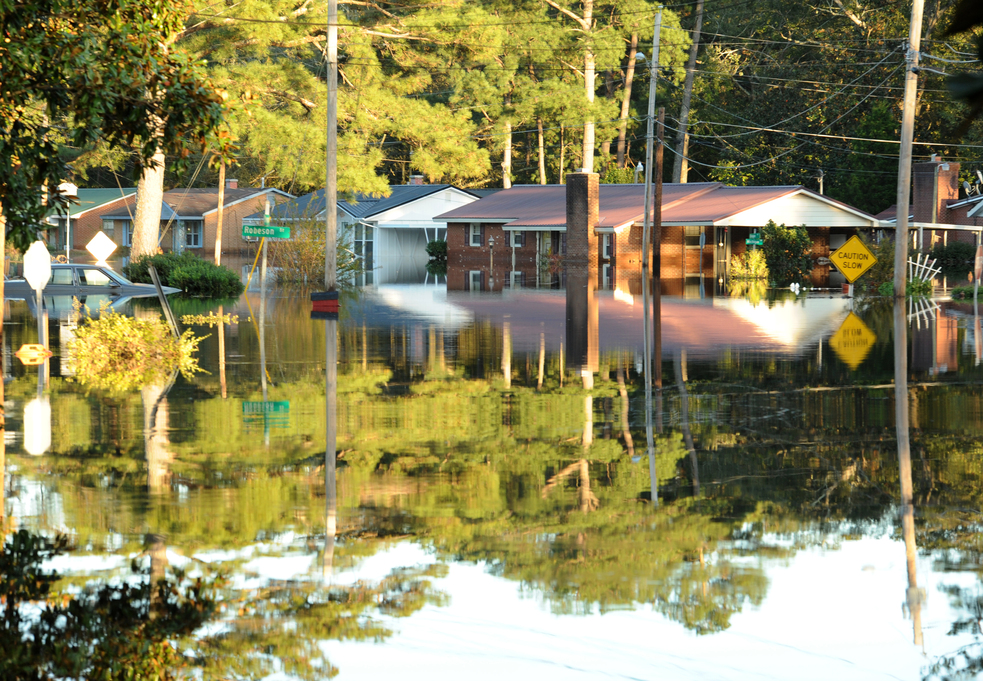A North Carolina investment firm and its property insurer have each won partial victories in a dispute over hurricane insurance claims that has been in court since 2019.
A federal district court judge for Eastern North Carolina dismissed the insured’s unfair trade practice claim against Penn National Mutual Insurance Co. related to damage from 2016’s Hurricane Matthew because it was filed too late, while finding a similar claim related to 2018’s Hurricane Florence was timely and can proceed.
Judge Louise Flanagan also dismissed a bad-faith/breach-of-contract claim as too late but allowed a fraud claim over the insurer’s appraisal process.
On Oct. 8, 2016, Bear Investment’s building was damaged by Hurricane Matthew, and the firm filed a claim. Penn National initially denied the claim, then, following an inspection and report by outside consultants, paid $75,000 toward settlement of the claim without explanation.
Using this payment and its own resources, Bear repaired the property. But the property “continued to deteriorate,” until on Sept. 14, 2018, Hurricane Florence made landfall. Wind and heavy rain continued in the area until September 17, 2018, causing damage to the property that Bear claims was worse than it would have been had the insurer paid plaintiff’s first claim in full.
Bear submitted a second claim for damages resulting from Hurricane Florence. Penn National retained an adjuster, who estimated that the cost to repair the damage was $86,739. Bear also hired an adjuster, who estimated the cost of repair at $4,295,764.
Penn National rejected plaintiff’s estimate on August 13, 2019. On September 4, 2019, the insurer said that it was mailing a payment of $85,739 “issued in good faith toward settlement of the loss.”
Bear then made a demand for an appraisal on November 12, 2019. Penn National allegedly “sought to stymie and quash the appraisal,” including by “instructing its appraiser not to participate and demanding the appraisal cease,” declining to investigate the accuracy of its appraiser’s conclusions, and refusing to adopt the estimate of Bear’s appraiser, according to the court. Bear says Penn National also sent a payment of $473,073 without explaining “how it came to that amount, what calculations it used, or what portions of the damage to the property it deemed was covered.”
Bear Investments sued Penn National, asserting claims for fraud in the appraisal process, bad faith breach of contract, and violations of the North Carolina Unfair and Deceptive Trade Practices Act (UDTPA).
UDTPA Claims
North Carolina statutes proscribe certain “inherently unfair, unscrupulous, immoral, and injurious” practices in the settlement of insurance claims. The statute of limitations for UDTPA claims is four years and the statute of limitations accrues, at the earliest, when the insurer denies the claim.
Since Bear alleges that Penn National paid it $75,000 in December 2016 toward the Hurricane Matthew claim, its cause of action under the UDTPA with respect to its Hurricane Matthew claim thus accrued in December 2016 and expired in December 2020, well before Bear amended its complaint on Sept. 16, 2022. The judge therefore concluded that the UDTPA claim with respect to Hurricane Matthew is time-barred.
On the other hand, Bear alleges that it filed a second claim after Hurricane Florence, and that Penn National paid $86,739 in September 2019 toward settlement of that claim, denying “the remainder of that claim.” This Florence cause of action under the UDTPA therefore accrued in September 2019 and expired September 2023. Since Bear moved to amend its complaint on September 16, 2022, before the limitations period expired, the court found this claim it is not barred.
Accordingly, the judge granted Penn National’s motion to dismiss with respect to the Hurricane Matthew claim and denied the insurer’s motion to dismiss with respect to the Hurricane Florence claim.
Fraud Claim
The statute of limitations for fraud is three years, and the cause of action does not accrue until the discovery by the aggrieved party of the facts constituting the fraud or mistake. Bear’s fraud claim implicates only the appraisal process, for which it made demand Nov. 12, 2019. This claim therefore accrued, at the earliest, on that date, and expired Nov. 12, 2022. Since Bear moved to amend its complaint on Sept. 16, 2022, the court said the fraud claim is timely.
Penn National also argued that the fraud claim related to the appraisal process should fail because Bear suffered no harm. But the judge said that Bear has not had the opportunity to respond to this argument, and it would be “imprudent for the court to reach a conclusion on this issue without hearing from all sides.”
The court denied Penn National’s motions to dismiss Bear’s fraud claim.
Bad Faith
Generally, under North Carolina law, the three-year statute of limitations period for a breach of contract claim accrues on the date of the breach. However, in an action for breach of a contract insuring real property, the same three-year limitations period accrues on the date of the loss. The loss occurred between Sept.14 and 17, 2018. Bear’s cause of action for bad faith therefore expired on Sept. 17, 2021, about a year before it filed its motion to amend its complaint. Accordingly, the court found that Bear’s bad faith claim is time-barred.
Top photo: Floodwaters in Lumberton, N.C., after Hurricane Matthew. Photo: FEMA/Jocelyn Augustino
Was this article valuable?
Here are more articles you may enjoy.


 Tesla Sued Over Crash That Trapped, Killed Massachusetts Driver
Tesla Sued Over Crash That Trapped, Killed Massachusetts Driver  FM Using AI to Elevate Claims to Deliver More Than Just Cost Savings
FM Using AI to Elevate Claims to Deliver More Than Just Cost Savings  Portugal Rolls Out $2.9 Billion Aid as Deadly Flooding Spreads
Portugal Rolls Out $2.9 Billion Aid as Deadly Flooding Spreads  These Five Technologies Increase The Risk of Cyber Claims
These Five Technologies Increase The Risk of Cyber Claims 